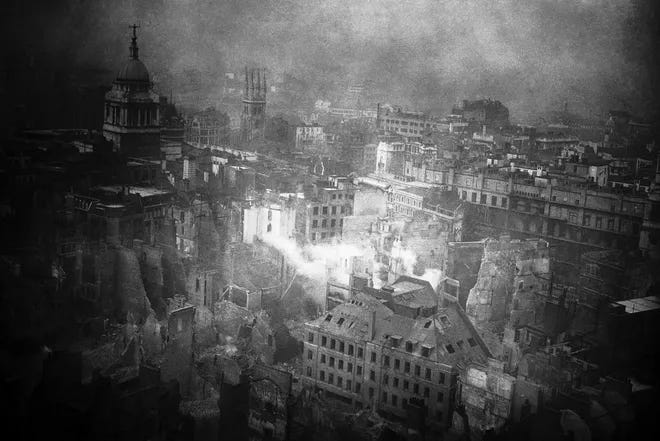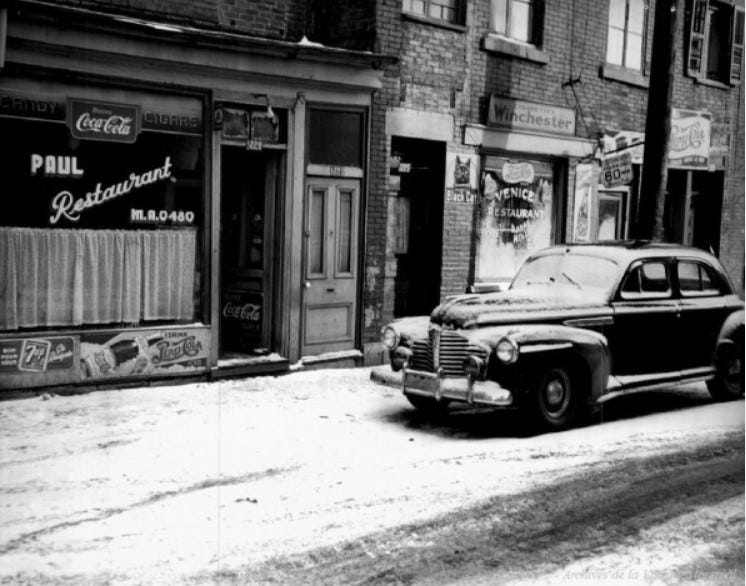In a nursing home not far from Richmond, Virginia, there is a ninety-six year old retired chemical engineer named Harrison Ruffin Tyler. He is the grandson of President John Tyler (1841-1845). It’s astonishing to think that there is someone alive today who is the grandson of a man who knew the Founding Fathers, a grandson of a person who was conceived around the time of the storming of the Bastille. History’s current moves much faster than the steady trickle of our lives. In family history telling and being told the stories of our parents and grandparents is a slow drip. We can make time almost stand still.
My father once shared a memory of the death of his grandfather.
It was November 1940. My father was a little boy. His grandfather Con had worked at the Montreal Gazette for over fifty years, first as a printer and compositor, and later as an editor and book reviewer. Con was at the Gazette into his eighties. My father did not particularly like his grandfather, whom he remembered as an overbearing presence in the family, but he did always acknowledge that Con was a great newspaper man. Even in retirement, my father recalled, his grandfather followed politics closely. In conversations around the family dinner table he offered informed commentary on world events.
In his last days Con was still mentally engaged in the fate of the world. My father said that on his deathbed Con predicted that people would soon believe that the ultimate threat was not Germany but the Soviet Union. (This was not perhaps wild prognostication in 1940). More surprising was that Con was thinking about the next war when the outcome of the present one was still unknown, especially when he knew he would not be around to see its conclusion.
This family story fascinates me because it locates the subject, the teller, and the listener in world history. During Con’s last lengthy illness in the flat on Querbes Avenue, German airplanes dropped over a hundred thousand tons of incendiary bombs on Britain, demolishing two million homes and killing more than forty thousand people. When Germany failed to knock out British air superiority, Hitler, like Con, turned his attention to adversaries in the east.
It occurs to me that this deathbed prediction could not have been my father’s firsthand memory. He was six years old when Con died. He could not possibly have understood what Con meant. It must have been family lore. It is not however a “false” memory. What my father remembers is hearing a family retelling. He remembered when his grandfather died. He knew his grandfather predicted the Cold War, but the meaning of the statement could not have been absorbed in real time. The meaning was attached later as the family story imprinted that moment as a memory.
Con on his deathbed has for me now become part of my memory of my father, who was also fascinated by politics. My father had a memory. Then there is my memory of my father’s memory. The first memory is not only relived, it has also taken on more meaning— about the teller and the listener. The story of Con’s prediction opens like flower petals.
When my father shared this memory I had the pleasant shiver of telescoping time. An old man on his deathbed, living through history and predicting history, was already a person of the distant past, but connected to me through his grandson who was telling me about it now.
Con was born in 1854. My father passed away at the age of seventy-seven in 2011. Today, in 2025, I am two degrees of separation from a person born when human beings in the United States could be bought and sold. A person born before the transcontinental railroad, germ theory, or recorded sound. The gaslit world of smallpox, phrenology, and divine right of kings is within living memory.
People say that enslavement, the Great Famine, or the Shoah was so long ago so why should we still talk about it? We know the real reason people want to stop the talk of these events—because their stories are still alive. They happened to people who were known by people we know and are still being told.
I shared my father’s memory of Con with my son, who is also interested in politics and history. He remembers his grandfather but doesn’t remember the Soviet Union or the Cold War, which is as ancient to him as the presidency of John Tyler. I hope one day he tells the story of Con’s prediction in the winter of 1940, and says “this was a story my grandfather told” and for that moment he is in their presence, outside history, outside time.








Oh, my goodness, Lisa. This piece is lovely. I've been obsessed with this concept lately and lacked a way to articulate it. The memory of a memory is a beautiful way to put it.
Your newspaper connection touched me as well. My great-grandfather, born in 1863, was also a newspaperman with a 65-year career as the editor of a small-town paper in rural Kansas. Sadly, I never met him. He passed four years before I was born. My mother talked about him all the time. His stories have fueled some of my work here at Projectkin.
I've been thinking about tools we can all use to map our stories into historical context. It started with the Lafayette story. I have a variation that maps history to my "Sixteen" list of American and Swiss ancestors. I will consider how to share this tool more generally.
"...the pleasant shiver of telescoping time." It was worth reading the entire piece twice just to say that phrase out loud. Lisa Maquire hits a home run.